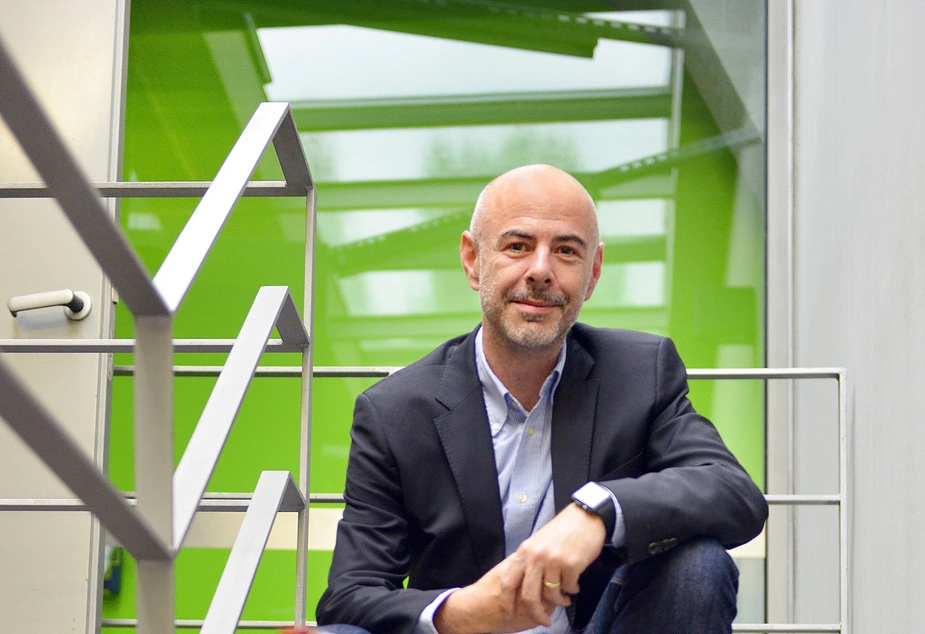A hub for basic research, teaching, and industrial application
How the Integrative Research Institute for the Sciences IRIS Adlershof supports many different technology start-ups
For almost two decades now, Prof. Emil List-Kratochvil has been dealing with a technology that many think holds a promise for the future: printed electronics. The Austrian-born solid-state physicist has been conducting basic research and promoting industrial applications, partly as a university researcher and a director of a scientific institute, and partly in industry projects. He then became a professor at Berlin’s Humboldt-Universität in 2015 – where he has been continuing his work in the Hybrid Devices working group. He also acts as head of the ‘Generative Manufacturing Processes for Hybrid Devices’ research group at Helmholtz-Zentrum Berlin and, on top of it all, is a committed supporter of the Integrative Research Institute for the Sciences IRIS Adlershof.
The question as to how he finds time to sleep faced with this triple burden led us straight to the core of this story: for List-Kratochvil, all these activities are, in fact, the three cornerstones of his field of action. As one of almost 30 professors supporting IRIS Adlershof, he sees himself as a linchpin between basic research, teaching, and the industry. In this way, chemistry, physics, and aspects of engineering come together as one.
His goal is to create hybrid systems in optics, electronics, and photonics and, through accompanying process development, rapidly bring them to industrial application. The ingredients are organic and hybrid semiconductors, conductive ink jet printing, nanostructures, and highly specific chemical syntheses.
Located close to the Wind Canal in Adlershof and now practically completed, the new IRIS building will become the new home for these activities. In addition to researchers and students, the door is also open for start-ups. This includes people like Natalia Zamoshchik, CEO of OrelTech GmbH, or the INURU founder Marcin Ratajczak. Both work closely together with IRIS and, like List-Kratochvil, like to speak of a symbiotic relationship. While the entrepreneurs are eager to discover straight paths to market-ready products and processes, the researchers are more interested in the detours and dead ends, deriving new knowledge and basic insights from alleged failures. ‘We are also keen on finding out why a process didn’t work,’ says the professor. In their bachelor’s, master’s, and PhD theses, his students explore issues that private companies are not usually able to address due to their limited financial and human resources. He also consults start-ups on technological issues while, in turn, start-ups like to recruit his students for their highly specialised knowledge.
INURU prints OLED technology, makes packaging and magazine covers glow, and contributes to developing novel battery systems. OrelTech develops conductive inks based on ionic precious metals. Using inkjet printing processes, they make it possible to apply a transparent conductive path to touch displays, OLEDs, and flexible solar cells and to print circuits on two and three-dimensional objects. The researchers benefit from the start-ups’ real-world applications in the field of hybrid systems because it helps them to refine their research and to develop application-focused research questions. ‘In turn, cooperation with IRIS is a huge chance for us because we can test and examine our materials with the institute’s high-cost equipment that we as a start-up could never afford ourselves,’ says Zamoshchik. Researchers help start-ups with using the complex technology and analysing their experiments.
Zamoshchik sees this as a perfect test run for bringing their high-tech inks to market. ‘All we have to do to get this invaluable support is to cross the street,’ she says gladly. The collaboration often results in joint publications that also create a mutual benefit: the academic reputation of the institutes rubs off on the start-ups, and researchers can add application-oriented research on the cutting edge of a high-innovation technology field to their publication list. ‘The productive collaboration with the team of Prof. List-Kratochvil and IRIS Adlershof is a location advantage that again confirms what a good decision it was to move from Tel Aviv to Berlin,’ she says.
By Peter Trechow for Potenzial – The WISTA Magazine
